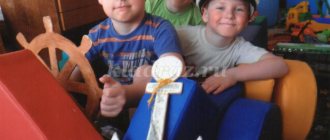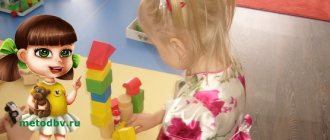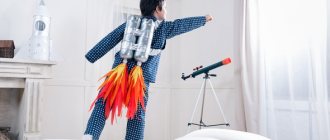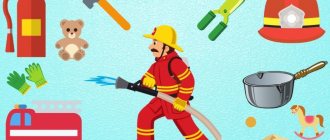When we hear the term “circus competitions for children,” we are surprised and do not believe in the reality of their implementation. After all, physically unprepared children cannot instantly become jugglers, do acrobatic tricks under the circus big top, or skillfully joke with the public like clowns. But fears aside, because circus competitions for children are designed to reveal the creative potential of children, engender artistry and ease of communication with the public. After all, almost every third person in the world is afraid to go on stage because they cannot feel millions of eyes on themselves, play a role, or be embodied in an image. And that’s why circus competitions for children from 5 to 16 years old are considered so valuable.
Circus competitions for children from 5 to 7 years old
"Balloon Juggling"
Equipment: You need a large number of half-inflated balloons made of durable and matte latex.
Rules of the game: Children are invited to rehearse and prepare a circus act in the genre of juggling. It is advisable that music be played in the hall during an impromptu rehearsal. For what? – So that children can not only juggle balloons, but also dance, creating a spectacular performance for their future audience. If possible, you can explain the rules of juggling to boys and girls and show examples of successful performances. You should initially work with two balloons, and when everything works out, then pick up a third one. During rehearsal breaks, you can organize battles, choosing the two most diligent “circus performers” from the team, bring them onto the stage, and let them juggle for a while. Whoever's balls fall to the ground loses. If desired, you can arrange a gala concert.
Recommendations: A circus competition can become one of the elements of a large-scale children's holiday, a physical activity at school, kindergarten during a break between intellectual activities.
"Rope Walker"
Equipment: a long rope of small diameter, as well as pins for finishing points, a fan or a long cane for balance.
Rules: There is no need to hang the rope, you just need to place it on a flat floor surface, mark the beginning and end of the rope walker’s path with pins. And during the game, each of the participants will put on shoes, pick up a fan or cane for balance and walk along the rope. The task is to walk beautifully without losing balance, doing tricks, for example, jumping, standing on one leg, doing a “swallow”, squatting and much more. The jury evaluates artistry, grace, and ease in performing tricks. The reward may be applause or sweet prizes.
Recommendations: It is advisable to conduct all circus competitions for children for micro groups. If the performance drags on, the children will begin to get bored, make noise, and get distracted, so it won’t be a colorful performance.
Physical education entertainment for children in the preschool group of preschool educational institutions
Physical education entertainment in the preparatory school group “TODAY THE CIRCUS IS ON OUR VISIT”
Physical entertainment for children of the preparatory group of preschool educational institutions.
The material may be useful to physical education instructors in preschool educational institutions and teachers.
Author: Leiko Galina Anatolyevna music director of MKDOU kindergarten No. 8 in Ostrogozhsk. Health objectives: To develop the skills of correct posture, developing the musculoskeletal system; Strengthen the respiratory organs and abdominal muscles; Develop the basic functions of the vestibular apparatus. Educational objectives: To consolidate the skills of walking and running in a column one at a time; walking on toes, on the outside of the foot; performing exercises with objects (soft sticks); crawling on a bench on your stomach. Develop a sense of rhythm, coordinate movements with music, performing elements of rhythmic gymnastics; Develop vital motor skills and abilities that promote health; Educational objectives: To develop in children the ability to show determination and self-confidence; Develop the ability to overcome physical difficulties, cultivate patience and endurance; Influence the development of a sense of beauty, lightness, grace. Equipment: arcs (4), sandbags (according to the number of children), soft colored sticks (according to the number of children), walkers (4), “throwers”, a box, balls with riddles, soft toys (elephant, monkey, hippopotamus, bear , tiger, lion, snake), candy. The entertainment is accompanied by musical accompaniment.
Progress of entertainment.
Children go into the hall and line up. Educator. Today is a performance for adults and children! Merry circus, Merry circus has arrived, To kindergarten! Everyone is happy to see the artists, Everyone goes to the parade! The “Circus” march sounds (Introductory part: walking in a column one at a time, on toes, on the outside of the foot, running straight, side gallop, running “snake”, imitative movements “cow”)
Educator. Everyone is looking at the middle. In the middle there is magic: There the eccentric took a little bunny out of his pocket. There, under the dome, a dancer flew away like a tit. The dogs danced there... You, of course, have been there. Guys, do you know what a circus is? (Conversation with children about the circus: what is the name of the place where the circus performers perform, what is the shape of the circus arena, what are the names of the artists working in the circus). Children sing the song “Today the circus is visiting us.” The whistle sounds and the clown Klepa appears to the music. He pulls a large box behind him.
Educator. Children, look who came to us? it's a clown! Klepa. The playpen is on fire! Arena stage! I am the clown Klepa - the athlete's best friend. Hello kids, Hello kids! Did you know that the circus was born almost 200 years ago and at first it was only equestrian. Because the circus showed nothing but horse racing. But now the circus is a holiday in which dexterous, strong, brave and talented artists perform. Do you want to be like them? I've been working in the circus for so long and I've learned a lot. And when I saw you, I immediately realized that I had a young generation growing up! Today I propose to turn into real circus performers. Do you agree? Children. Yes! Klepa. Do you all want to know, friends, what is here in my box? Parade-alley! Let's start the rides! And it’s okay that you are not champions. Educator. We can learn everything, it will be very useful to us in life! Klepa. Take all the sticks apart and start training. (The clown pulls out colored sticks from the box, fastened into one long one. Children take them apart and stand scattered) General developmental exercises with flexible sticks.
Main types of movements: Riveting. Do you want to become a giant? You need to stand on stilts! (takes out a walker from the box) Teacher. Taller than dad, taller than mom, Let's help ourselves become. We will only take stilts, We will break the record in height. Walking with a walker
Kepa. Of course, he is larger than a hedgehog, and the spines are longer. I saw it once at the zoo... Who is it? (Porcupine) Crawling on all fours with a load on the back (imitative “hedgehog” movements)
Klepa. Well done! That's it, it's decided, I'm taking you to work at the circus! (turns to the children mockingly)
Oh, you probably don’t know that not only people work in the circus, but also...
Children. Animals! Klepa. Absolutely right! And they came with me today. Do you want to see them, aren’t you afraid? Then guess the riddle! Here they are, my riddles. (The clown takes balloons out of the box). Klepa. To get that riddle, you need to ride on the ball. Whoever gets the riddle faster is a brave man! Brave guys, go ahead, a test awaits you.
(Children sit on balloons and jump on them until they burst. There are notes with riddles in the balloons) Klepa reads the riddles and takes out soft toys from his box that correspond to the answer)
With huge ears and tusks in an arc, Walks through the savannah like a big giant , And he will be able to clean himself with his trunk, There is no one stronger than the African...
(Elephant)
The beast waddles through raspberries and honey.
He loves sweets very much. And when autumn comes, He climbs into the hole until spring, where he sleeps and dreams. (Bear)
Walks in a striped skin, Digs the ground with a strong paw, Harmless in the picture, But dangerous even in the circus!
He is not an affectionate kitten, but a serious beast... (Tiger cub)
The king of beasts is a big cat, he growls a little out of anger.
He sleeps in the den, having eaten, wears a mane, is formidable... (Lion)
Clumsy and large, He grazes under water.
Stuffing his belly, Nibbles grass... (Hippopotamus)
Makes faces, the crooked beast, Mimics everyone.
In the circus or zoo, her success is guaranteed. (Monkey)
The ornament writhes.
Don't make him angry - he will sting! (Snake) Klepa. But this is my... Manyunya (calls the snake that)
She’s angry with me.
Aren't you scared? Children. No! (The clown takes out of the box a snake tied by a fishing line. The snake, controlled by the fishing line, “jumps” on the clown. He gets scared and runs away, the snake “catches up” with him)
As a result, the Clown hides the snake in a box and sits on it.
Klepa. Oh oh oh. And you say it’s not scary. Educator. Don’t be upset, Klepa, but play a game with the guys. It's about you, it's called "Clown". “Clown” (finger game)
The clown is red, freckled, he strokes himself on the head, shows his freckles,
the kids really like him.
- three claps.
Nose like a red tomato.
- they stroke their nose with their hands,
and there is enthusiasm in his eyes.
- with the help of hands they depict eyes and clap their eyelashes - fingers.
Tears flow like from a faucet -
“collect the tears in the palm.”
In multi-colored pockets.
– show palm-to-hip pockets.
And in the pockets, here and there,
the hands are folded into a “bud”, raised up, and the “petals” open.
Red roses are growing.
Now he cries, now he laughs - index fingers vertically to his eyes, then to his lips.
Either he is kind, or he fights—
they stroke their hands, then throw their fists forward.
Oh, how clumsy he is -
his hands on his belt, his body tilting left and right.
But that’s how everyone needs him.
– arms are crossed on the chest, to the sides and on the belt. Klepa. Oh, what a kid, I’ll play with you! It’s true that I’m afraid to open my box, in case my Manyunya isn’t sleeping. (He carefully looks into the box and takes out the “throwers”). Game "Throwers". (A net is stretched across the center of the hall. Children are divided into two teams and positioned on different sides of the net. The game begins and ends with a whistle. The throws are thrown over the net. At the end, the children count the number of throws on their side. The team that has fewer on its side wins thrower. The game is played several times)
Klepa. How you played fun and together. Well done! For this I will give you one magic ball. Come on, help me, bring the box.
Klepa takes a ball out of the box and invites the children to his place. Throwing the ball up, he pierces it and candy falls on the children.
Klepa.
Klepa. Circus is fun and success. And cheerful children's laughter! Educator. We will clap our hands, Because we love everyone! Goodbye, Clown Klepa. Children. Goodbye! The children walk through the hall to the music and say goodbye to Klepa.
Children leave the hall to the music.
We recommend watching:
Physical education entertainment for children of the preparatory group. Scenario: Physical education entertainment for children of the senior preparatory group. Scenario: Physical education entertainment in kindergarten together with parents. Preparatory group Synopsis of a physical education lesson “Winter fun” for children of the senior group in kindergarten
Similar articles:
Physical education leisure in the preparatory group in the winter in the hall
Circus competitions for children from 8 to 12 years old
In children of primary school age, coordination of movements becomes better, so circus competitions for children gradually become more complex and increase in time period. They are usually used for New Year's holidays, birthdays and other grand celebrations that involve the convening of a large number of guests, participants, and spectators. So what competitions can we recommend for boys and girls studying in elementary school?
"Experienced trainers"
Equipment: a large number of soft toys in the form of wild or domestic animals. The main thing is that they are stable and have a long neck and a small head. Circus rings or plastic hoops.
Rules: A circus arena is being prepared for the trainer, that is, soft toys are placed on the stage along the perimeter of the circle at an equal distance from each other. And the participants will approach the center of the arena one by one, holding identical sets of hoops in their hands. The task of each trainer is to throw circus rings or hoops on all the animals one by one. The jury counts the number of hits and determines the winner and the most experienced trainer.
Instructions: Additionally, you can use circus costumes to make the event colorful and solemn. There must be background music in the hall; it will encourage both the participants, fans and spectators.
"Funny Stilts"
Equipment: improvised stilts, these can be plastic cubes with ribbons tied at the edges.
Rules of the game: Children are given improvised means from which they can construct stilts. Usually children tie ribbons to the cubes, lift the free ends up and hold them with their hands. Afterwards, a relay race is organized, when two kids try to reach the finish line at speed on improvised stilts.
Instructions: For improvised stilts, it is better to choose durable plastic so that it does not break under the baby’s weight and injure his leg. And the ribbons or ropes should be wide and long so that participants of different heights can comfortably fit on stilts, while holding them with their hands using available means.
Thematic selection of gaming material, theme: “Circus”
Author: Davydova Svetlana Alekseevna.
Expand children's knowledge about the circus. Enrich children's vocabulary on this topic. Form a stable idea of color, quantity, size, geometric shapes. Teach children to determine the number of objects by touch, the heaviness and lightness of objects. Continue to teach children to determine their position in space, to understand the concepts of “top”, “bottom”, “on”, “under”, “middle”, “in a circle”, “next to”. Introduce children to an unconventional method of drawing with toothbrushes. Improve the skills of modeling, gluing, cutting with scissors, designing from building materials and planar geometric shapes. Develop memory, fine motor skills, coordination of movements.
Equipment:
Picture-scheme of a circus tent made of geometric shapes, geometric shapes cut out of colored cardboard. Scissors. Blank for cutting “tickets to the circus”. Background picture “circus arena”, color silhouette images of a zebra, monkey, lion, counting sticks. Background for the “clown head” applique, details for gluing: hat, bow, wig. Bags filled with cotton wool, bags filled with stones. “Weights” toys. Buttons in two sizes: red, white, blue, green and yellow. A picture for laying out buttons with the image of a strongman with weights and barbells. Silhouette images of elephants in four sizes. Silhouette color pictures of animals, their shadows drawn on paper, cages for these animals of different sizes. Small toys “horses”, plasticine, feathers, blocks of small building material. Boxes with lids and laces inside. Animal mask caps, a hoop wrapped in red napkins. A silhouette picture of a clown's head in a cap with a collar and clothespins pasted onto cardboard. Large fabric snake exercise toy. Balloons (not inflated), with one and three pebbles inside. Jars of water covered with lids with paint on the inside, paints, brushes, double pourable bottles with stickers of different colors. Background picture with an image of an arena and a magician, toothbrushes, paint. Ball, cube, toy, scarf. Audio recordings: “Circus” (from the film of the same name), “Love the Circus.”
Thematic lesson "Circus"
Hello, friends! Have you already gone to the circus with your baby? Last week we took Veronica to the circus for the first time. And in this regard, I decided to conduct a thematic lesson for her on the theme of the circus. Veronica, like all children, loves animals, so the lesson turned out to be interesting and fun. If your child is also interested in the topic of animals, then read the article “Thematic lesson “Animals on the farm.”
Progress of the lesson:
Music from the movie "Circus" is playing.
- Hello children. Today we are going to the circus.
Construction of the “Circus tent”
Children make a circus tent out of geometric shapes. The teacher asks to name the shapes (circle, triangle, square, rectangle) and their color.
Didactic game “In the circus arena”
- Let's put the elephant on a large pedestal. Put? Now let’s put the lion on a small pedestal. Walk the horse around in a circle. Place the monkey on the swing. Make a ladder out of counting sticks.
Scissor cutting "Tickets to the Circus"
Children use scissors to cut tickets along the line.
— A clown performs at the circus. He is cheerful and tries to cheer everyone up.
Application "Clown"
- Look, it's a clown. Let's put makeup on him, make him beautiful. Glue on the clown's hair, hat and bow.
Game with clothespins “Jolly Clown”
“Now we’ll help decorate another clown.” Let's make him a beautiful collar from clothespins.
— A strongman performs in our circus. He is very strong and can lift enormous weights.
Experiment “Heavy-light”
- Hold the bags in your hands and tell which ones are light and which are heavy. Children are offered bags with cotton wool and pebbles.
Game with buttons “Circus strongman”
— In this picture, a strongman in a circus lifts heavy weights and a barbell. Organize buttons by color and size.
Dynamic pause “Playing with weights”
- Take the weight in your right hand. Lift it up, put it on your shoulder, lower it to the floor. Grab the kettlebell with your left hand. Lift it up, put it on your shoulder, hide it behind your back. Place a weight on the floor in front of you and jump over it.
In the circus, trainers always perform with their trained animals.
Didactic game “Animals in Cages”
— After the performance, the animals return to their cages. Help put the animals in cages. Place a tall giraffe in a tall cage, then select suitable cages for the zebra and monkey.
Didactic game “Rank the elephants by height”
Children arrange cardboard pictures of elephants from largest to smallest.
Didactic game “Find the shadow”
Children attach colored silhouette images of animals to their black silhouette shadows.
Exercise “Trained Animals”
Children, if desired, put on animal hats and follow the teacher-trainer’s commands: stand, sit, lie down, crawl, crawl into a fiery ring-hoop, walk along a bench, climb over an obstacle.
Construction of “Horse Fences” from building material
Children make fences from bars placed on the side edge: low - from one bar, medium - from two bars, high - from three bars laid on top of each other.
Game "Circus Horse"
A saddle is attached to the fly horse toy - a piece of thick fabric on the back and a decoration - a feather is stuck into a piece of plasticine attached to the horse's head. Then the horse jumps over the fences. To jump over a high fence, the horse must jump high.
Didactic exercise “Snake”
— Open the box and take out the snake cord. How long is the snake? The snake is long. Pull the string and show how the snake crawls. Place the string snake back into the box and cover with the lid.
Dynamic pause “Performance with a snake”
Children lie down on the “snake” laid out on the floor with their chests and swing their arms and legs, then turn over, lie on their backs, and raise their arms and legs up. Walking on a snake, crawling, jumping over.
— And there are also magicians performing at the circus.
Didactic exercise “What’s in the ball?”
Children are given balls and asked to determine by touch which ball has one pebble and which has many pebbles.
Didactic game “What disappeared?”
Three objects are laid out in front of the children, covered with a scarf, and one object is quietly removed. Children must name this missing item.
Didactic game “Colored water”
The teacher paints the lid of the water jar in advance. After the words “Hocus Pocus!” The jar is shaken and the water becomes colored. Children name the color the water is colored. Then, using a brush and paint, they paint the water in the non-pouring bottle according to the color of the sticker pasted on it.
Drawing “Fireworks in the circus arena”
Children draw fireworks with paints using toothbrushes, moving them up and to the sides from the image of the magician.




